UK must do more on climate change, says CBI
- Published
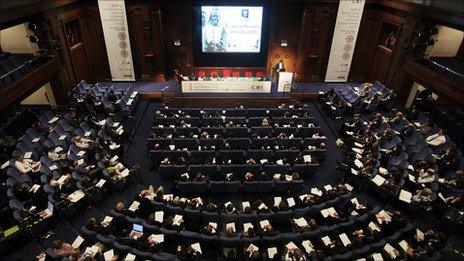
The CBI's message is uncompromising - business must be ready to tackle climate change
Outgoing CBI boss Richard Lambert pulls no punches in his assessment of developed economies' attitude to global warming.
"The momentum for change in Europe is weak, while the needle on the dial of consumer behaviour has hardly changed," he says.
He even points to a US survey where consumers ranked climate change bottom of a list of 21 potentially damaging issues facing their country.
The fact he is addressing an auditorium that is little more than half full merely adds to the sense of despondency.
The strapline above which he is addressing the business community at this year's CBI Climate Change Summit, chaired by the BBC's environment analyst Roger Harrabin, reads: Tackling climate change in a new economy - is your business ready?
From what we've heard so far, the answer would appear to be a resounding no.
Climate scandal
But while his disappointment is manifest, Mr Lambert says there is reason for hope.
For a start, he is simply referring to progress made on the climate change agenda since the CBI launched its report on the issue three years ago. Progress has been slow, he concedes, but this is in part due to high expectations borne from over-optimism.
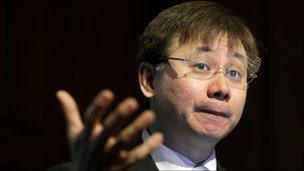
Mr Lee says sustainability brings economic benefits to businesses
"We have learnt to be more realistic," he says.
There are also important mitigating factors, some of which are specific to the UK, he argues.
First, we have just undergone the deepest recession for more than 70 years.
Second, public trust has been damaged by a view that the consequences of climate change may have been exaggerated, or at least manipulated, following the recent revelations about research conducted at the University of East Anglia - the so-called Climategate scandal.
And finally, the recent change of government. This has nothing to do with any lack of commitment on its behalf, merely that its new policies will take time to implement, Mr Lambert says.
However, the message from the CBI is clear - now is the time for action.
"We are going to have to raise our game substantially as the costs of business-as-usual will rise exponentially. The UK will lose out to emerging economies unless we invest in green infrastructure," Mr Lambert argues.
Clinton's on his way
But while the business community may have been slow to act, there is at least a wider understanding of the issues.
"Three years ago, climate change was a niche subject. Now it is centre stage," he says.
And there are some big-name companies that have embraced the "new economy". Mr Lambert points to the profits Marks & Spencer has made from its Plan A initiative to reduce its environmental impact, and the £500m-a-year savings Tesco has made from energy efficiencies.
And there is further encouragement when Irwin Lee, vice president and general manager of consumer product giant Procter & Gamble's UK and Ireland operations, takes the stage.
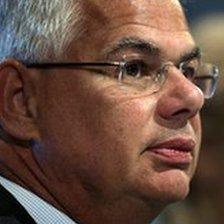
Mr Green "I'm not really that bothered about climate change."
He outlines the steps the group has already taken to reduce its impact on the planet, which include using raw materials in its manufacturing plants so efficiently that just 2% waste remains, and commitments it has made for the future, which include ensuring that 30% of the power used to run its factories comes from renewable energy sources by 2020.
Following a testament from former US President Bill Clinton to the company's target of saving a life an hour by 2020 by providing vaccines against diseases in the developing world, Mr Lee's message is simple: "We believe it is the right thing to do, but there are economic benefits to pushing sustainability".
Mr Clinton's cameo, by the way, is delivered via recorded video and not, rather disappointingly, in person.
'Not bothered'
Further ringing endorsements of the business benefits of tackling climate change come from top executives from Lloyds Bank, BT and Mark Elborne, chief executive of GE's UK, Ireland and Benelux operations.
"It's good for business, good for the brand and good for recruitment. It's a very smart agenda from a business perspective," he says.
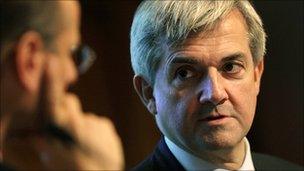
Mr Huhne talks of the great opportunities a more green economy can present
We could be forgiven for questioning at this point Mr Lambert's downbeat appraisal of the UK business community's action on climate change - until, that is, a leading executive appears to throw a spanner in the works.
Step forward Andy Green, chief executive of Logica. "I'm not really that bothered about climate change," he shrugs.
But what seems to be a deliberately obtuse comment turns out to be one of the more insightful thoughts of the day.
Population growth is such - just over six billion now and projected to grow to nine billion by 2050 - that, Mr Green tells us: "Humans are a plague, and the track record of plagues is not good".
He argues that the overuse of the earth's finite natural resources is equally, if not more, serious: "Sustainability will be the defining issue of our generation… And it's up to business to sort it".
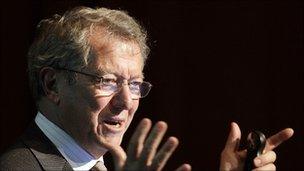
Sir David believes China is powering ahead in efforts to tackle climate change
Insurance policy
Energy Secretary Chris Huhne, next up, would argue that politicians also have a vital role to play, although he gives few details on the coalition government's plans for boosting the UK's green economy.
He does, however, announce there will be further consultation and a delay in the government's Carbon Reduction Commitment scheme, designed to tax high energy use - the decision announced in the Spending Review in October not to rebate those companies that cut their energy use considerably had proved deeply unpopular.
Turning to the wider issues, he urged businesses to treat climate change as they would any other risk.
"Rather than get caught up in absolutes, we should prefer to think in terms of probability and risk… If science said there was a 90% chance of your house burning down, you would take out home insurance," he says.
But he also talked of opportunities: "My challenge to you is this - commit to the industries of the future. Britain accounts for just £112bn of the global trade in low carbon and environmental goods and services. With our deep reservoirs of engineering and scientific expertise, we can do so much more."
'Heresy'
After a wonderfully entertaining turn by Ben Page, chief executive of Ipsos Mori, in which he extracted lessons on consumers' attitudes to climate change from single parents, divorce and gonorrhoea, comes the main event.
Former Chancellor of the Exchequer and renowned climate sceptic Lord Lawson, versus former chief government scientific adviser and co-author of "The Hot Topic", Sir David King.
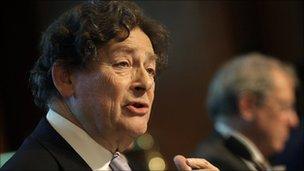
Lord Lawson argues that if temperatures do rise, we should focus on adaptation, not mitigation
Lord Lawson opens by thanking the CBI for inviting "a heretic to attend the congress of the great believers".
He argues that the evidence for climate change is not as widely accepted among the scientific community as the government would have us believe.
He says there will be no meaningful, international carbon agreement, and therefore the UK economy stands to lose hundreds of billions of pounds a year by committing to reduce carbon emissions while the US, China and India surge ahead, powered by cheap and abundant fossil fuels. We should focus on adaptation, rather than mitigation, he says.
Sir David reiterates what he sees as the irrefutable scientific evidence, before arguing that there are already significant commitments made by emerging economies, not least China, to cut carbon emissions. Mitigation, he says, is cheaper than adaptation. It represents, he says: "The greatest opportunity since the industrial revolution".
As Lord Lawson acknowledged with his opening gambit, in the eyes of this audience, there was only ever going to be one winner.
- Published12 October 2010
- Published15 November 2010